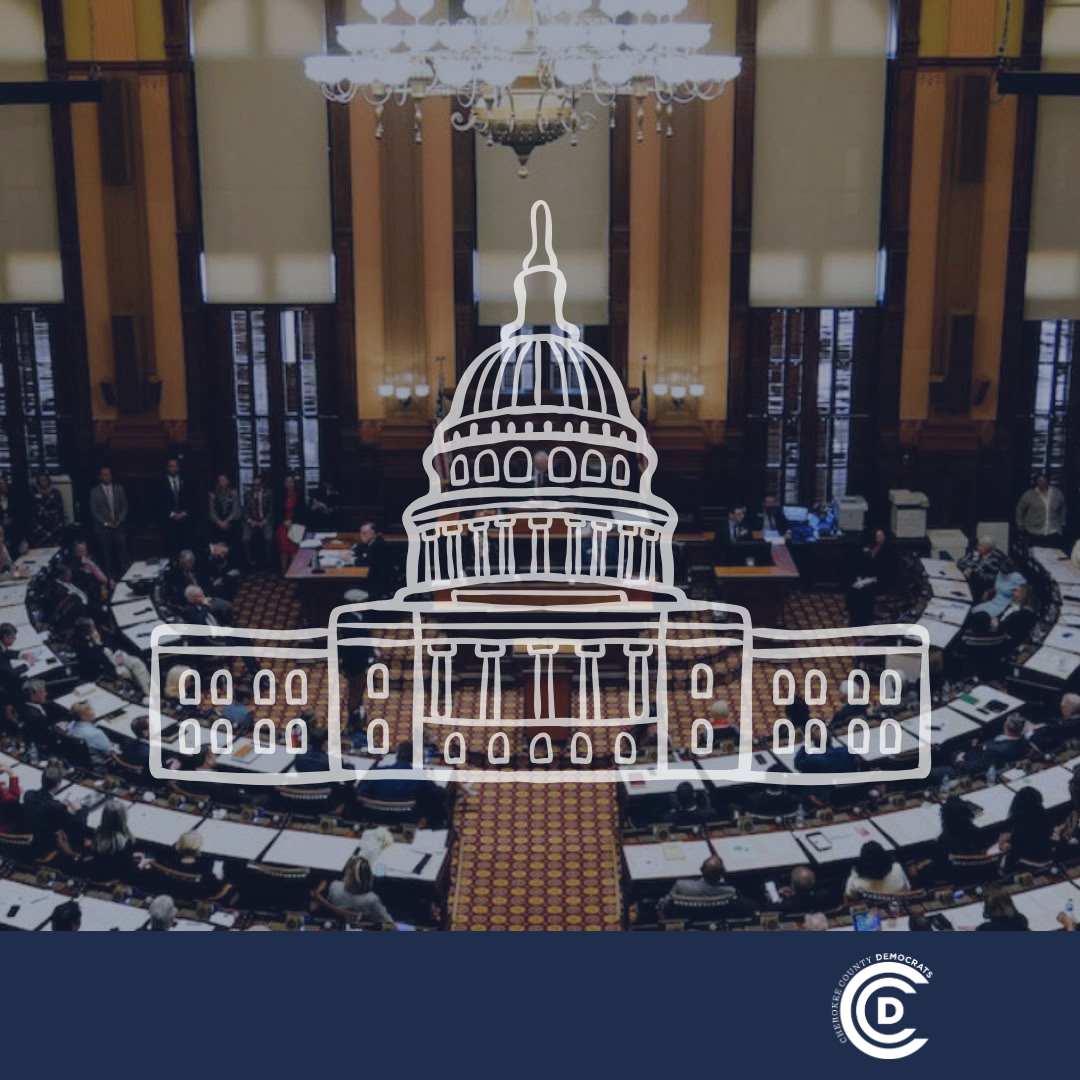On March 18, 2025, the following Georgia House of Representatives’ committees met to discuss bills to potentially advance:
- Motor Vehicles voted on SB 293
- Code Revision voted on SB 96 and SB 153
- Intragovernmental Coordination voted on SB 151, SB 252, and SB 260
- Higher Education voted on SB 85, SB 149, and SB 193
- Regulated Industries voted on SB 40, SB 125, and SB 131 and heard SB 22, SB 220, and SB 241
- Education voted on SB 17, SB 44, and SB 154
- Judiciary heard SB 245 and voted on SB 100 and SB 298
Select the associated links to read each bill in full.
Motor Vehicles
SB 293
This bill would allow veterans to have up to four free veteran’s license plates.
The bill passed committee.
Code Revision
SB 96
This bill aims to reduce administrative burden on state agencies by reducing the number of boards. A lot of these boards are inactive or perform duplicative services. This bill will restructure a couple boards to make them function more efficiently. These agencies include the following:
- The Environmental Advisory Council, which has been inactive for more than a decade
- The Jekyll Island Citizens Resource Council, which has been inactive since inception
- The Stakeholder Advisory Council, which performs limited tasks and will be absorbed by the Erosion and Sediment Control Advisory
- Governor’s Office for Children and Families Advisory Board, which has been inactive for more than 6 years; the DFACS State Advisory Board already advises on the needs of the foster care system
- The Palliative of Care and Quality of Life Advisory Council, which has been inconsistent and inactive between 2019 and 2024
- The Board of Homeland Security, which has not held a vote since 2020
- The Employment First Georgia Council, which has been inactive since 2021
- The Georgia State Games Commission, which has been inactive for over a decade
- The Lottery Advisory Board, which has been inactive for a decade
- Council on the Lupus Foundation, which will move to the Department of Public Health
The bill passed committee.
SB 153
This bill is the annual cleanup bill that the code revision committee and legislative council recommend to correct errors or omissions in the code.
The bill passed committee.
Intragovernmental Coordination
SB 151
This bill establishes a North Fulton Development Authority to grow North Fulton; the cities can opt out of the development authority if they want. The bill does not prevent any municipality from making its own development authority.
The bill passed committee.
SB 252
This bill allows the City of Atlanta to transfer a piece of property over to Atlanta Public Schools as a no-loss land swap. Due to code written decades ago, any city with a population higher than 300,000 cannot just transfer property unless that property was already deemed abandoned for public use. Atlanta wants to let Hope Hill Elementary use the existing Tricycle Park as a play area for the kids and fence it in.
The bill passed committee.
SB 260
This bill would change the number of board members for the Central State Hospital Redevelopment Authority from nine to four. The state shut down Central State Hospital in Milledgeville, leading to much controversy regarding what to do with the land, which has caused board members to keep resigning.
The primary purpose of this authority is to find uses for these buildings and create jobs. The other purpose is to create some affordable housing.
The bill passed committee.
Higher Education
SB 85
This bill, discussed previously (see HERE), creates framework by which the General Assembly can fund scholarships for young people or young adults who have been in the Georgia foster care system as children and also supplements other available sources such as federal grants and the Hope Scholarship to ensure these individuals can cover not only tuition but also other necessary costs of education such as books, fees, housing, and meal plans. Participants must meet eligibility requirements and must attend a Georgia college or university; they will be eligible for up to $30,000 in addition to any other grants they earn.
The bill passed committee.
SB 149
This is a workforce development bill regarding the Georgia Tuition Equalization grant program, which encourages Georgia residents to attend eligible private colleges by aiding with students’ educational costs. This bill will not remove institutional eligibility requirements but will allow the program to serve more students. Newly qualified students at four-year institutions will be eligible for the program; these institutions must be accredited by the Southern Association of Colleges.
The bill passed committee.
SB 193
This bill creates a framework for a pay-for-performance for the Adult Workforce Diploma program. This program specifically targets people from the minimum age of 21 to the maximum age of 40 and gives them an opportunity to complete their high school diploma and develop critical employability and career skills through the Technical College System of Georgia. This is similar to the TCSG’s dual achievement program, but that program cuts off at the age of 21. The bill includes a sunset clause for 2031.
The bill passed committee.
Regulated Industries
SB 40
This is a cleanup bill designed to help prosecutors and sheriffs mitigate metal theft by moving the definition of the catalytic converter from one section to another and by codifying what a secondary metal recycler can pay cash for. The limit is $100 up to two times per day; recyclers cannot pay for copper wire, utility cables, or batteries. The bill also creates an online registry for secondary metal recyclers.
The bill passed committee.
SB 125
This bill allows individuals to take the professional engineering exam immediately after finishing their academic coursework rather than waiting until after finishing their work requirement.
The bill passed committee.
SB 131
This bill establishes the Georgia Healthcare Professionals data system to provide better healthcare information to consumers. The system will have a statewide list of providers, the type of services they provide, and the location of their practice. The database will include a wide range of professionals, including physicians, acupuncturists, counselors, and social workers.
The bill passed committee.
SB 22
This bill introduces new requirements for adopting federal guidance. When the Georgia Department of Education (DOE) State Superintendent is planning to adopt federal guidance, they must disclose how this guidance will impact the DOE and how the guidance will be implemented. This disclosure must occur within 15 days of the decision to adopt and must be posted publicly within 45 days of the decision. The public disclosure includes sending this information to State government committees involved in education. This bill is intended to promote transparency in how federal guidance is applied to our local schools.
The bill will return to the committee at a later date.
SB 220
This bill renames low THC oil to medical cannabis and increasesthe 5% THC cap to 50%; doctors will be allowed to prescribe the levels. SB 220 also removes the designation of liquid ounces to ounces so as to include vaping, capsules, gummies, and other products. Additionally, the bill will allow a distribution increase from 1 ounce to 2 ounces to accommodate a 30-day supply. The bill restricts hemp, cookies, candies, or raw plant material and allows associations to educate on these products.
The bill will return to the committee at a later date.
SB 241
Under current Georgia law, the accepted methods to dispose of a human body are burial green, burial cremation, alkaline hydrolysis, and donation to a medical school or other research facility. This bill seeks to legalize human composting with licensing. Human composting is putting a body in a container to decompose naturally. Remains do not mix.
The bill will return to the committee at a later date.
Education
SB 17
This bill requires all public schools to equip all classrooms with mobile, silent panic alarm technology (i.e., wearable buttons) that would connect all agencies, including 911, with real-time information to coordinate the response; this information would include crucial mapping data of the facilities and surrounding areas. These alarms would be used in times of active shooters, medical emergencies, weather emergencies, and other events requiring coordination of information and agencies. Schools with panic alarms in place will not be required to change to this specific kind.
The bill passed committee.
SB 44
This bill will allow school systems to go to a 10 millage rate, down from 14 mills. If schools go below 10, they will lose their equalization.
The bill passed committee.
SB 154
In anticipation that the Department of Education will be eliminated, this bill modifies references to the department in the Georgia code, specifically regarding how licensed professionals must receive their licensing from an entity accredited by the Department of Education. References to the Department of Education will now be followed by the phrase “or its successor” in all instances within the Georgia code.
The bill passed committee.
Judiciary
SB 100
This bill would enable adopted people born in Georgia whose adoptive parents sought issuance of a new birth certificate to obtain an uncertified original, pre-adoption birth certificate that may not be used for legal purposes. This legislation has been proposed for the past two years. The current process requires adoptees to hire counsel and petition the superior court for a copy, at great expense and some delay.
There is no promise of anonymity to birth parents who relinquish their children, as the sealing of the original birth certificate only occurs if the child is thereafter adopted and if the adoptive parents request issuance of a new birth certificate. Many other states allow this.
The bill passed committee.
SB 245
This bill, discussed previously (see HERE), would extend to grandparents the right to seek modification prior orders granting them visitation rights to see their grandchild(ren) after their child (the parent) is deceased, incapacitated or incarcerated. The standards of only granting such rights for good cause shown will remain the same; this modification may only be sought after once every two years. Currently, parents and guardians may seek amendment of grandparents’ visitation orders, but grandparents cannot.
The bill will return to the committee at a later date.
SB 298
This bill would provide that in civil actions, all grants or denials as well as refusals to grant or deny sovereign immunity to a defendant would be immediately appealable. The right to appeal would need to be exercised within 30 days of the grant or denial. Currently, if immunity is denied in a ruling, the matter must proceed through discovery and trial before the denial is appealable, and that costs taxpayers a lot of money if immunity is ultimately granted after trial.
The bill passed committee.



